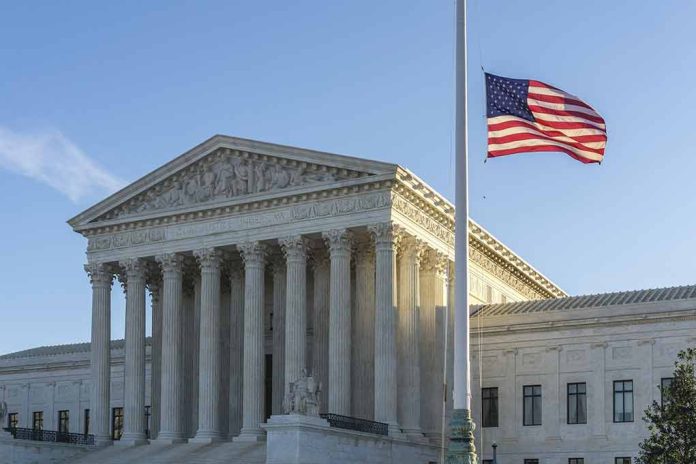
Chief Justice John Roberts defends judicial independence amid growing tensions with President Trump over threats to impeach federal judges for their rulings.
Key Takeaways
- Chief Justice John Roberts publicly stated that impeaching federal judges over disagreement with their rulings is inappropriate and undermines judicial independence.
- Roberts’ rare public statement came after President Trump called for the impeachment of a federal judge who ordered deportation flights to Venezuela to be halted.
- The Trump administration disregarded the judge’s order, claiming the flights had already left U.S. jurisdiction when the ruling was issued.
- Roberts emphasized that the appellate review process, not impeachment, is the proper channel for addressing disagreements with judicial decisions.
- This marks the second time Roberts has publicly rebuked Trump’s criticism of the judiciary, recalling a similar defense of judicial independence in 2018.
Roberts Issues Rare Public Rebuke
Chief Justice John Roberts Jr. firmly defended the independence of the federal judiciary against recent threats from President Donald Trump. Roberts emphasized that impeachment of federal judges is not an appropriate response to disagreement with their rulings. This rare intervention came after Trump called for the impeachment of a federal judge who had ordered a halt to deportation flights carrying migrants to Venezuela, highlighting growing tensions between the judicial branch and political leaders who disagree with court decisions.
The Chief Justice’s statement specifically addressed the controversy without directly naming Trump, stating clearly that the proper way to address disagreements with judicial rulings is through the established appellate review process. This position reinforces the constitutional separation of powers and reflects Roberts’ ongoing concern about maintaining public trust in the judiciary as an independent branch of government free from political influence or intimidation.
Rare statement by Chief Justice John Roberts h/t @MelissaQuinn97
"For more than two centuries, it has been established that impeachment is not an appropriate response to disagreement concerning a judicial decision. The normal appellate review process exists for that purpose." https://t.co/rA0ViPoE55
— Natalie Brand (@NatalieABrand) March 18, 2025
The Venezuela Deportation Case
The specific case that triggered this constitutional confrontation involved deportation flights of migrants to Venezuela. A federal judge had issued an order to halt these flights, but the Trump administration reportedly disregarded the ruling, claiming the flights had already departed U.S. airspace when the order was issued. This created a direct challenge to judicial authority, with the administration essentially arguing that the court’s jurisdiction no longer applied once the flights were underway.
The incident escalated when a Republican lawmaker introduced articles of impeachment against the judge in question, and Elon Musk publicly supported the impeachment effort, calling it “necessary.” This political response to a judicial ruling represents precisely the type of pressure that Roberts warned against in his statement – the use of impeachment as a weapon to undermine judicial decisions that certain political figures find unfavorable.
Historical Context of Judicial Independence
Roberts’ current defense of judicial independence follows a similar clash with Trump in 2018, when the Chief Justice publicly responded to Trump’s criticism of an “Obama judge” by stating, “We do not have Obama judges or Trump judges, Bush judges or Clinton judges.” This pattern of defending the judiciary against political attacks underscores Roberts’ commitment to maintaining the courts as an independent arbiter of the law, regardless of which political party appointed individual judges.
The tensions between the judicial branch and political leaders highlight the ongoing challenges to the separation of powers in American democracy. Several legal disputes from the Trump era may eventually reach the Supreme Court, placing Roberts and the other justices in the position of ruling on politically charged cases while attempting to maintain the Court’s reputation for impartiality and adherence to legal principles rather than political affiliations.
Implications for Constitutional Balance
This latest confrontation raises significant questions about the future of judicial independence in an increasingly polarized political environment. Roberts’ statement serves as a reminder that the Constitution established three co-equal branches of government specifically to prevent any single branch from accumulating too much power. When political leaders suggest using impeachment to remove judges whose decisions they disagree with, they threaten this carefully constructed balance.
For conservative Americans who value constitutional principles and the rule of law, Roberts’ defense of judicial independence represents an important affirmation that no individual, regardless of their political position, stands above the established legal system. The ongoing tension between the judiciary and political branches will likely remain a critical issue as the nation navigates complex legal challenges in the coming years.
Sources:
US Chief Justice Roberts rebukes Trump’s attack on judge
Chief Justice Roberts Rebukes Trump Call to Impeach Judges for Rulings
Justice Roberts rebukes Trump’s call to impeach Venezuela deportation case judge



